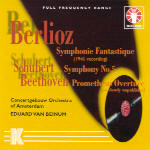The period from 1945 to 1960 was a critical one in the history of the (Royal) Concertgebouw Orchestra, for this was the time that Eduard van Beinum essentially created the great ensemble that we now know. A conductor of the “modern” school, Beinum couldn’t have been more different from his predecessor, Mengelberg, whose increasingly wayward and eccentric interpretive style by the 1940s had become as anachronistic as his alleged Nazi sympathies were repugnant. The three works on this disc all reveal the virtues inherent in lively tempos, firm rhythms, and a Toscanini-like clarity of articulation and instrumental balance. The Schubert features marvelously taut playing in the three quick movements, let down only by an underpowered Andante that is anything but “con moto”. The Prometheus Overture (with the London Philharmonic) has the right zest and verve, though the band is certainly no Concertgebouw.
Prime interest will certainly center on the Berlioz, particularly as the same orchestra’s outstanding version of the work from the 1970s under Colin Davis has become a classic. The seeds of that performance are clearly present in this one of 1946, particularly in the characterful wind playing and intense sound of the trombone choir. Beinum’s unsentimental approach to the work pays particular dividends in the flowing slow movement and sharply profiled, exciting finale. Unfortunately for Dutton, though, all of these qualities can be heard to even better effect in the same conductor’s 1951 re-make, available on Beulah. Not only is the sound much better both in dynamic range and depth, but the orchestral execution has improved noticeably: the opening of the “March to the Scaffold” tells all. The quiet brass play with greater security, the timpani make a real crescendo, the lower strings offer sharper rhythms and accents with less graininess, and so it goes. If you want Beinum’s Berlioz, look for the Beulah CD unless you simply must have the Schubert Fifth as well.
































